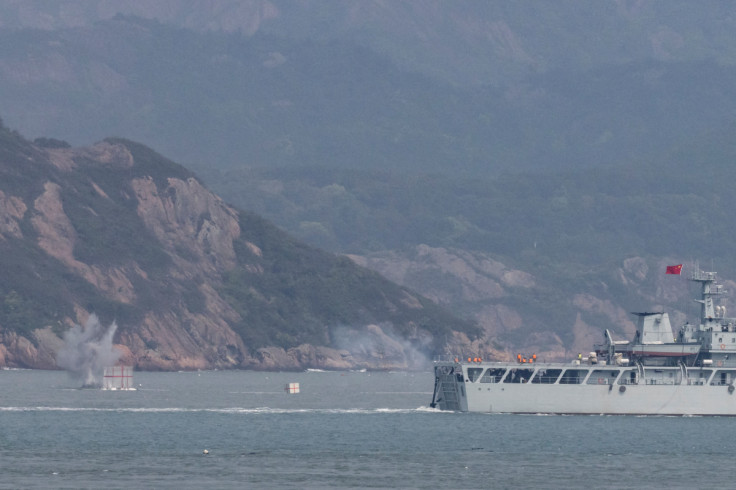House Committee To Simulate War Game Scenario Of China Invading Taiwan, Reports Say
KEY POINTS
- The panel will serve as senior advisers to a 2027 U.S. president in the simulation
- The goal is to 'make sure we never have to do this in real life,' Rep. Krishnamoorthi said
- China conducted a three-day military exercise near Taiwan last week
Members of the House Select Committee on China will participate in a war-game scenario Wednesday that simulates Beijing's invasion of Taiwan. The simulation comes a week after China's military conducted live-fire drills near Taiwan.
The House committee's simulation will include an exercise wherein members will act as senior advisers to a U.S. president in 2027, Semafor initially reported, citing a source close to the matter. The goal of the closed-door activity is aimed at finding ways through which the U.S. can help deter China from invading the self-governing island.
The two-hour war game simulation will see committee members confronting a scenario wherein China will attempt to invade Taiwan by force, Becca Wasser and Andrew Metrick, defense experts at think tank Center for a New American Security (CNAS), told Semafor.
Members of the House China committee will war game a Chinese invasion of Taiwan tomorrow, in a scenario where they’re advisors to the president in 2027 https://t.co/JW2QuUGaTa
— Semafor (@semafor) April 19, 2023
In the said scenario, which will play out about a week's worth of conflict, Metrick and Wasser will play the role of China. Members of the committee will then be given a range of options to choose from on how the U.S. government should respond to a Chinese invasion. The options range from messaging and military to diplomatic and economic responses, Metrick explained.
Lawmakers who will act as the 2027 U.S. president's advisors will use an open-source, unclassified war game developed by CNAS.
"The goal of this exercise is to make sure we never have to do this in real life," said Rep Krishnamoorthi, D-Ill., in a statement to Semafor. Krishnamoorthi is among U.S. lawmakers who met Taiwanese President Tsai Ing-wen earlier this month when the Taiwanese leader visited its allied country.
During the meeting with Tsai, Krishnamoorthi said that the U.S. bond with Taiwan was "unshakeable" and the country will "always support them in defending their freedom," as per a transcript of the interaction released by the House.
"War games really show what happens to our policies after we make contact with a competitor's strategies. It's like that famous Mike Tyson quote, 'Everyone has a plan until they get punched in the mouth,'" a source close to the committee told Axios.
Aside from exercises that involve military responses, the simulation will also include economic aspects that may give lawmakers a deeper sense of how China's invasion could affect business and infrastructure, Axios reported.
Earlier this month, Rep. Mike Gallagher, R-Wis., Chairman of the committee, told Associated Press of his plans to work on strengthening Taiwan's defenses. He said it was "obvious" that Chinese President Xi Jinping was "intent" on getting Taiwan back under Beijing's wing.
"We need to be moving heaven and earth to enhance our deterrence and denial posture, so that Xi Jinping concludes that he just can't do it," Gallagher said.
Last week, China conducted three days of military exercises around the island. Among the drills simulated was sealing off Taiwan and striking key locations on the self-governing island.
After China's military exercises, Taiwan's foreign minister Joseph Wu told CNN that it appeared as if Beijing was getting ready "to launch a war against Taiwan."
In a statement, Tsai condemned China's large-scale military drills, calling out the leadership for actions that were not reflective of a "responsible major nation in this region." The Chinese government previously warned of a "serious impact" on U.S.-China relations if Tsai pushed through with her U.S. trip, according to the outlet.
Xu Xueyuan, China's charge d'affaires, told journalists that allowing Tsai to make a transit in the U.S. undermined China's sovereignty, adding that the White House should bear "all consequences" for its actions.
Meanwhile, regular Taiwanese residents are reportedly taking defense training in preparation for when China does invade their territory. Organizers of classes at Kuma Academy said the goal was to establish a "first line of psychic defense."
Aside from providing practical tips on evacuation, classes also focused on disinformation regarding Beijing's potential invasion as they want to thwart Chinese narratives about Taiwan being unable to defend itself through an attack.

© Copyright IBTimes 2024. All rights reserved.






















